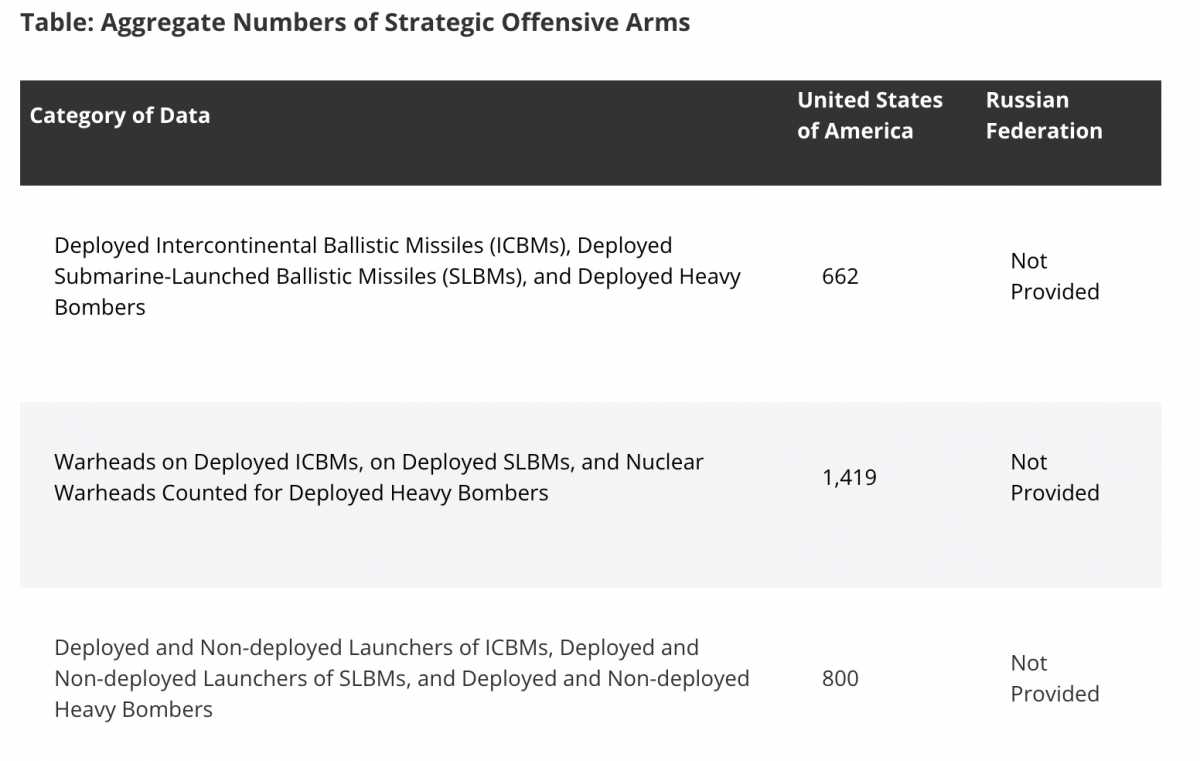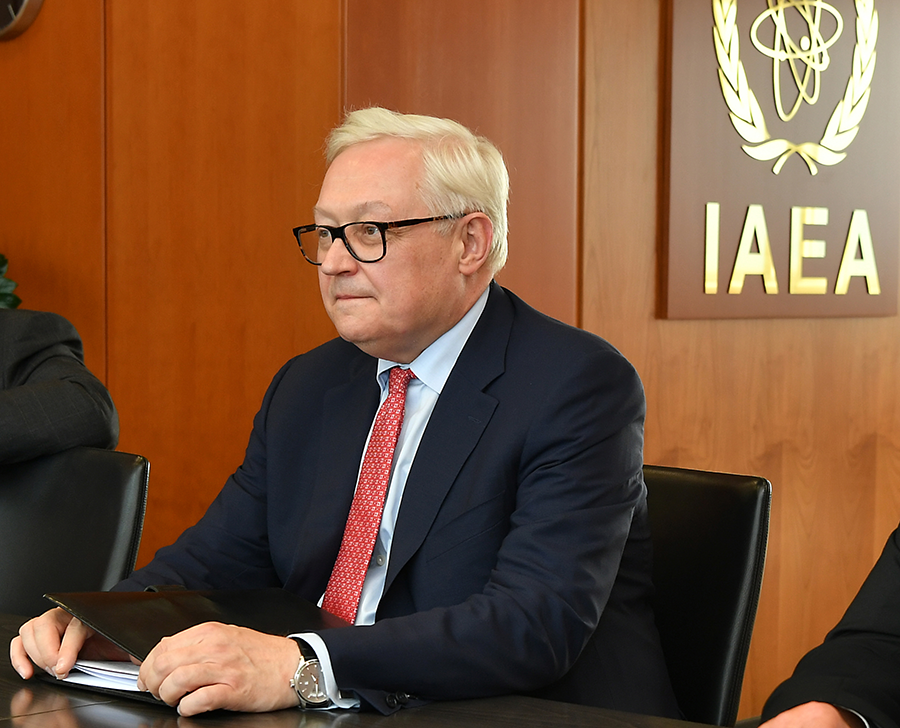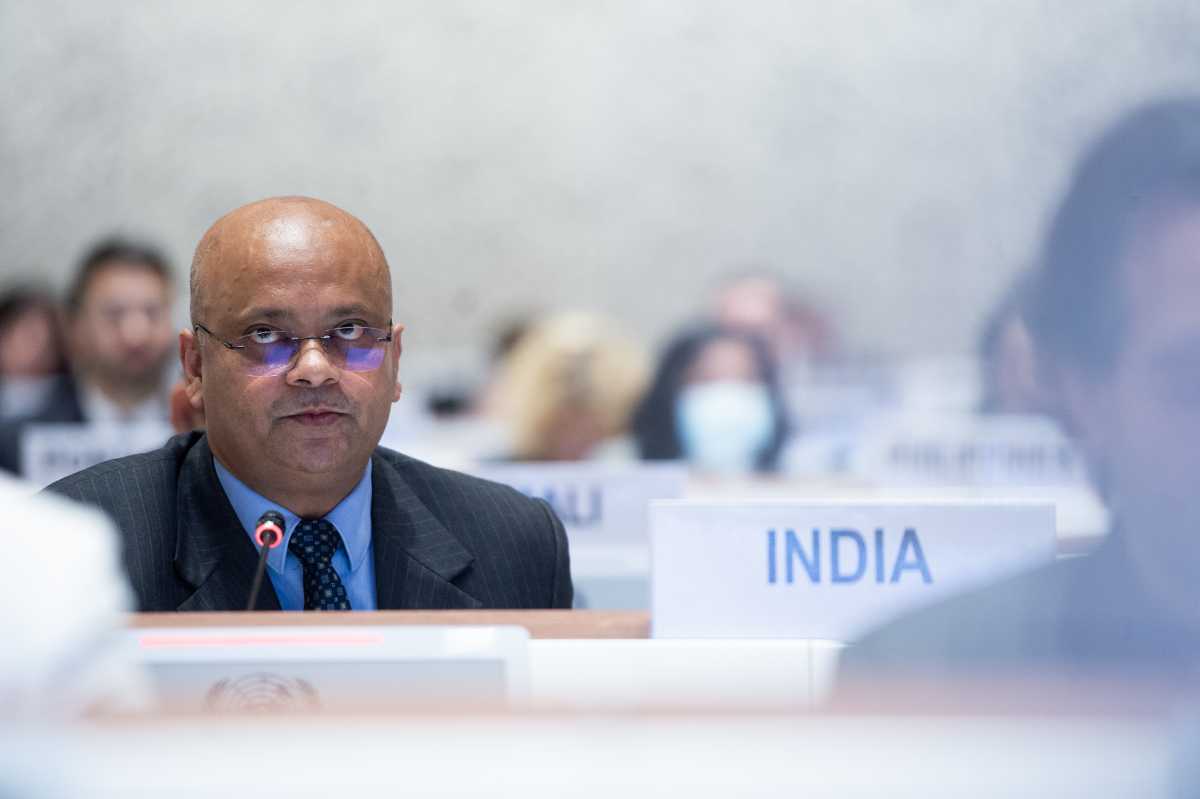With less than two years to go before the expiration of the last remaining treaty limiting the world's two largest arsenals, Russian leaders continue to reject U.S. offers to discuss a new nuclear arms control framework.
In late December, Russia sent a diplomatic paper rejecting the United States’ proposal to resume arms control talks, according to U.S. officials, and Russia's foreign minister announced Jan. 18 that Russia was interested in talks on a new arms control framework to supersede the New Strategic Arms Reduction Treaty (New START), which expires Feb. 5, 2026.
In a speech Jan. 17, Russian Foreign Minister Sergey Lavrov said that “amid a ‘hybrid war’ waged by Washington against Russia, we aren’t seeing any basis, not only for any additional joint measures in the sphere of arms control and reduction of strategic risks but for any discussion of strategic stability issues with the United States.”
In response to a question at an event hosted Jan. 18 by the Center for Strategic International Studies, Pranay Vaddi, senior director for arms control at the White House National Security Council, said "I think that they will want to come back to the table at some point, and ideally before expiration, but Russia could also be unpredictable."
Vaddi stated that not only was the proposal rejected, but also, there was no counterproposal presented, thus Russia is undermining the spirit of Article VI of the Nonproliferation Treaty (NPT). By not even offering a counterproposal, “Russia is minimizing their obligations under the NPT” and not even attempting “to pursue negotiations in good faith” Vaddi added.
The U.S. proposal was first announced by White House National Security Advisor Jake Sullivan at the June 2, 2023, annual meeting of the Arms Control Association. Sullivan declared that the United States is ready to engage in nuclear arms control diplomacy with Russia and with other nuclear-armed members of the NPT “without preconditions.”
Sullivan suggested that “rather than waiting to resolve all of our bilateral differences, the United States is ready to engage Russia now to manage nuclear risks and develop a post-2026 arms control framework.”
Russia's first reaction to the proposal was promising. On June 5, Kremlin spokesperson Dmitry Peskov said that Russia remains open to dialogue with the United States on arms control. He described Sullivan’s comments as “important and positive,” but said Russia wants to learn more about the proposal through formal diplomatic channels. A few months later, the Biden Administration followed up with a diplomatic non-paper on the Sullivan proposal.
By August 2023, however, Russian officials had already started signaling that in their view nuclear arms control talks “cannot be isolated from the general geopolitical and military-strategic context,” which includes the conflicts in Ukraine.
Despite this attitude and its decision to suspend implementation of New START, Russia pledged, in a Statement at the First Session of the Preparatory Committee for the 11th Review Conference of the Parties to the NPT in July 2023 that it will “continue to adhere to the central quantitative limits stipulated in the New START Treaty, inform the United States of launches of ICBMs and SLBMs through an exchange of relevant notifications, and observe a unilateral moratorium on the deployment of ground launched intermediate- and shorter-range missiles.”
However, Russia warned, “this moratorium is under serious pressure in view of the Pentagon's active preparations for the deployment of ground-launched intermediate- and shorter-range missiles in Europe and the Asia-Pacific region.”—LIBBY FLATOFF, program assistant, and SHIZUKA KURAMITSU, research assistant
United States Issues Report on Russian Compliance with New START
The State Department released its annual report to Congress Jan. 31 on the implementation of the 2010 New Strategic Arms Reduction Treaty (START), which set limits on the strategic forces of both the United States and Russia and established a verification system involving inspections and information sharing. However, Russia paused New START inspections in 2022 and has not been providing data on its strategic nuclear forces since it suspended implementation of the treaty in early 2023.
Despite the verification obstacles, the report assesses that “the Russian Federation likely did not exceed the New START Treaty’s deployed warhead limit in 2023…[and] that there is not a strategic imbalance between the U.S. and the RF that endangers the national security interest of the United States."
However, the report also notes that the United States cannot certify Russian compliance with the New START Treaty limits due to failure to comply with inspections and its suspension of the treaty Feb. 28, 2023.
Deputy Russian Foreign Minister Sergei Ryabkov said in a Jan. 22 interview with RIA Novosti that “for now, we are focusing on the task of maintaining the quantitative indicators of strategic offensive weapons at the levels established by the treaty within the period of its validity…on the condition that further destabilizing steps by Washington.”

Russia Leads P5 Process Meetings on Nuclear Matters in 2024
As tensions between Moscow and the West remain high, Russia has assumed the chair of an annual dialogue among the five nuclear-armed states that are members of the nuclear Nonproliferation Treaty and have permanent seats on the UN Security Council, known as the "P5 Process."
 Deputy Foreign Minister Sergei Ryabkov announced Nov. 28 that Russia “has outlined our proposals on the agenda and the rough schedule and can apparently expect to receive feedback from other members of the Five.”
Deputy Foreign Minister Sergei Ryabkov announced Nov. 28 that Russia “has outlined our proposals on the agenda and the rough schedule and can apparently expect to receive feedback from other members of the Five.”
The P5 process was established in 2007 and the coordinator position rotates on a yearly basis. The state in charge for the year is responsible for scheduling a formal conference and coordinating the agenda.
In August 2023, Russia took over the coordination of the group and Deputy Foreign Minister Sergey Ryabkov made comments about Russia’s priorities during their chairmanship, stating that not only is political will needed but also, “the acceptance by all parties of new multipolar realities, as well as concrete practical steps towards a general de-escalation and, in particular, a post-conflict settlement along the Russia-West line.” In October 2023, on the margins of the 78th session of the UN General Assembly First Committee, Russia convened a meeting of the group at the working level.
Russia took over the chairmanship of the group from the United States, which sought to foster discussions on cooperation on transparency measures, ICBM notifications, keeping a human-in-the-loop on decision-making for nuclear weapons employment, five-way emergency communication networks, and respective nuclear postures and policies.
Within the framework of the U.S. chair, there were five meetings at the working level: in August and October 2022 in New York; in February 2023 in Dubai; in June 2023 in Cairo; and in August 2023 in Vienna. In August 2024 the People's Republic of China is due to take over as the chair of the process.
In July, as Russia was about to assume the role of P5 Process chair, Ryabkov said “In principle, such work is not useless, but inflated expectations should not be associated with it either.”
On Aug. 30, 2023, at the Valdai Discussion Club, Dmitry Stefanovich, a Research Fellow with the European Leadership Network, expressed the hope that “The Russian chairmanship can be used to…ensure the mutual communication of important signals…as well as de-escalate and reduce tensions in relations between nuclear powers.”
Belarus Adopts New Doctrine Regarding Russian Nuclear Weapons
Almost a year since Russian President Putin announced he could transfer tactical nuclear weapons to Belarus, and a month after they were deployed, Belarusian defense minister, Viktor Khrenin, stated that they “will put forth a new military doctrine that for the first time provides for the use of nuclear weapons.”
In a briefing Jan. 16, Khrenin defended the new doctrine by saying “the deployment of tactical nuclear weapons on the territory of the Republic of Belarus is considered an important measure of the preventive deterrence for potential adversaries from unleashing armed aggression against the Republic of Belarus.”
Belarusian President Lukashenko warned in an interview Jan. 28, following the announcement of the new doctrine, that “nuclear weapons represent a strong deterring factor… This is why we will use them immediately once aggression is launched against us.”
In April, the doctrine will go to the All-Belarusian People’s Assembly for approval. The Assembly works in parallel with the parliament and its approval is needed before the doctrine becomes official according to Russian state media RIA Novosti.
2024 Conference on Disarmament Starts Under Indian Presidency
The 2024 session of the Conference on Disarmament (CD), the single multilateral disarmament negotiating forum of the international community, commenced Jan. 23 under the Presidency of Ambassador Anupam Ray of India.
 Established in 1979 with the First United Nations General Assembly Special Sessions devoted to Disarmament (SSOD-I), the CD historically played a crucial role as the sole negotiating body for multilateral nuclear disarmament. It has 65 member states including five nuclear weapon states under the nuclear nonproliferation treaty as well as four other nuclear possessor states. However, since the negotiation of the Comprehensive Nuclear Test Ban Treaty in 1996, the conference has been deadlocked over competing negotiating priorities and has failed to engage in substantive negotiations on legally binding instruments.
Established in 1979 with the First United Nations General Assembly Special Sessions devoted to Disarmament (SSOD-I), the CD historically played a crucial role as the sole negotiating body for multilateral nuclear disarmament. It has 65 member states including five nuclear weapon states under the nuclear nonproliferation treaty as well as four other nuclear possessor states. However, since the negotiation of the Comprehensive Nuclear Test Ban Treaty in 1996, the conference has been deadlocked over competing negotiating priorities and has failed to engage in substantive negotiations on legally binding instruments.
Ambassador Anupam Ray of India, permanent representative of India to the CD addressed that “we meet today in the midst of conflict. We meet under the terrible thought of the possibility of war,” noting the long stagnation and geopolitical difficulties of advancing the work of the CD.
Despite challenges, “an imperfect solution is better than no solution in the current circumstances,” and the Indian presidency will focus on “finding agreement on the program of work,” according to the president.
The 2024 session of the CD schedule is divided into three; part I from Jan. 22 to March 28; part II from May 13 to June 28; and part III from July 29 to Sept. 13, totaling 24 weeks.
Following the Indian presidency, it is planned that Indonesia, Iran, Iraq, Ireland, and Israel will preside over this conference, whose presidency term rotates every four weeks.
Nuclear Ban Treaty Marks Third Anniversary of Entry Into Force
Jan. 22 marked the third anniversary of the entry into force of the Treaty on the Prohibition of Nuclear Weapons. A week before the anniversary, São Tomé and Príncipe ratified the treaty totaling the number of states-parties to 70 with 93 signatories.
On the anniversary, Austria's Foreign Minister Alexander Schallenberg emphasized “[t]he scientific facts are clear. … There is no alternative to nuclear disarmament.” Expressing concerns about the recent nuclear threats, Shallenberg underscored that “[i]t is high time that we free the world from this scourge that threatens our existence and prioritize the security of all humanity.”
TPNW recently had their second meeting of states-parties from Nov. 27 to Dec. 1 in 2023 at United Nations Headquarters in New York. With the participation of some 59 states-parties, 35 observer states, and 122 nongovernmental organizations, the meeting produced two outcome documents: the political declaration and a set of decisions.
In line with what was decided at the first meeting of states-parties, member states reviewed the intersessional progress on key agendas, inter alia, victims assistance and environmental remediations, and the Scientific Advisory Group. The meeting also decided to take a new step to challenge the nuclear deterrence doctrine while centering the humanitarian perspectives.
Following Austria and Mexico, Kazakhstan will preside over the third meeting of states-parties, which will be held in March 2025 in New York.
For more information on the second meeting of states-parties to the TPNW, see: “TPNW States Challenge Nuclear Deterrence Doctrine” by Shizuka Kuramitsu, Arms Control Today, January/February 2024.
In Case You Missed It ...
- A.I. and nuclear decisions shouldn’t mix, U.S. says ahead of Biden-Xi summit, by Olivier Knox, The Washington Post, Nov. 9, 2023
- “A new nuclear arms race is here. How to slow it down,” by the editorial board of The Washington Post, Nov. 19, 2023
- “The Uncertain Future of the New START Treaty,” by Steven Pifer, Victor Mizin, and Patricia Jaworek, Deep Cuts Commission, Dec. 19, 2023
- "China Quietly Rebuilds Secretive Base for Nuclear Tests," by William J. Broad, Chris Buckley, and Jonathan Corum, The New York Times, Jan. 9, 2024
- "AI in War: Can Advanced Military Technologies be Tamed Before it's Too Late?" by Steven Feldstein, Bulletin of Atomic Scientists, Jan. 11, 2024
- "The Nuclear Ban Treaty Is Taking a Step Forward” by Shizuka Kuramitsu, Arms Control Association Issue Brief, Jan. 17, 2024
- "The Future of Arms Control Lies in the Nuclear Ban Treaty," by Melissa Parke, Arms Control Today, January/February 2024
- Nuclear Armageddon: How Close Are We?, a BBC documentary film, January 2024
- "The Doomsday Clock Announcement," by Bulletin of Atomic Scientists, Jan. 23, 2024
- "Fear, Ambition Propel Xi’s Nuclear Acceleration," by Chris Buckley, The New York Times, Feb. 4, 2024
- "Underlying Challenges and Near-Term Opportunities for Engaging China," by Tong Zhao, Arms Control Today, January/February 2024
- “Against Compartmentalization,” by Buzhinskiy, Evgeny P., Orlov, Vladimir A., Semenov, Sergey D., PIR Center, Dec. 26, 2023
